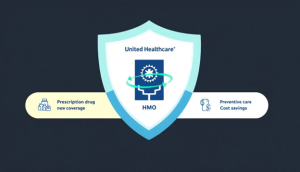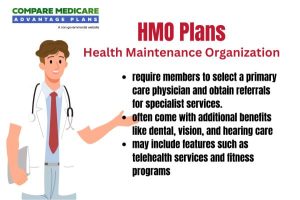




United Healthcare HMO Advantage Plan
Looking into a Medicare Advantage plan? United Healthcare HMO Advantage Plan combines comprehensive benefits with ease of coordinated care. This article will outline the features, plan types, and the enrollment process to help you decide if it’s right for you.
Key Takeaways
- UnitedHealthcare HMO Advantage Plans provide comprehensive Medicare coverage, including additional benefits like vision, hearing, dental, and fitness services, while requiring members to choose a primary care provider for coordinated care.
- The plans include various types, such as Standard HMO, HMO-POS, and Dual Special Needs Plans (D-SNP), each tailored to different healthcare needs and allowing for varying degrees of provider flexibility.
- Enrollment in UnitedHealthcare HMO plans is straightforward, with specific eligibility criteria and key enrollment periods, including the Initial Enrollment Period and Annual Enrollment Period, ensuring timely access to healthcare coverage.
Compare Plans In One Step!
Understanding United Healthcare HMO Advantage Plans

UnitedHealthcare offers UnitedHealthcare Medicare Advantage plans that include at least the same Medicare coverage as original Medicare Part A and Part B. These Medicare plans often integrate additional benefits, such as a Medicare plan that includes: learn about Medicare
- Vision hearing coverage
- Hearing coverage
- Dental vision coverage
- Fitness coverage
These HMO options integrate various aspects of healthcare into one plan, providing comprehensive care without requiring multiple insurance policies.
Members of UnitedHealthcare HMO plans are required to choose a primary care provider who will coordinate their healthcare needs.
This primary care physician acts as a gatekeeper, ensuring that all medical services are streamlined and necessary referrals to specialists are made. This system promotes coordinated care and often leads to better health outcomes for members.
One key feature of HMO plans is the in-network requirement:
- Members typically must use healthcare providers within the plan’s network for covered services, except in emergencies.
- This network structure helps keep costs low, as in-network providers have agreed to negotiated rates with UnitedHealthcare.
- Many HMO plans also offer a $0 premium option, appealing to cost-conscious seniors.
Types of United Healthcare HMO Plans
UnitedHealthcare offers a variety of HMO plans, each designed to cater to different healthcare needs and preferences. These plans emphasize coordinated care and involve a network of healthcare providers. The main types of HMO plans include Standard HMO Plans, HMO-POS Plans, and Dual Special Needs Plans (D-SNP).
Knowing the differences between these Medicare plan types helps in selecting the one that best fits your healthcare needs.
Standard HMO Plans

Standard HMO plans require members to obtain care exclusively from a network of designated providers. This means that the plan emphasizes cost management and coordinated care by limiting access to a specific group of doctors and hospitals. While this might seem restrictive, it ensures that members receive care at lower costs and with greater efficiency.
Using in-network providers often results in lower out-of-pocket costs compared to other types of plans. With Standard HMO plans, members benefit from having their healthcare needs managed under one umbrella, ensuring that all aspects of their care are covered without the need for multiple insurance policies.
HMO-POS Plans
HMO-POS (Point-of-Service) plans offer a blend of HMO and PPO features, providing more flexibility in choosing healthcare providers. Unlike Standard HMO plans, HMO-POS plans allow members to opt for care from out-of-network doctors for certain services.
This flexibility can be particularly beneficial for those who need specialized care not available within their primary network.
However, it’s important to note that while HMO-POS plans offer more provider options, using out-of-network services typically comes at an additional cost. This means members must weigh the benefits of greater flexibility against the potential for increased expenses when seeking care outside the network.
Compare plans and enroll online

Dual Special Needs Plans (D-SNP)
Dual Special Needs Plans (D-SNP) are specifically designed for individuals eligible for both Medicare and Medicaid. These plans offer specialized services and support tailored to the unique needs of these individuals.
D-SNP plans often include additional benefits that cater specifically to the complex health requirements of their members, including chronic special needs plans and chronic special.
For those who qualify, D-SNP plans provide a comprehensive healthcare solution that integrates the benefits of both Medicare and Medicaid. This ensures that members receive the highest level of care and support necessary for managing their health conditions effectively.
Benefits of Choosing a United Healthcare HMO Plan

One of the primary advantages of choosing a United Healthcare HMO plan is the potential for lower out-of-pocket costs compared to other Medicare options.
Focusing on in-network providers and coordinated care, HMO plans help members save money on their healthcare expenses. Many United Healthcare HMO plans also come with lower premiums, further contributing to cost savings.
In addition to cost savings, United Healthcare HMO plans offer 2025 united healthcare services:
- A comprehensive range of services, including preventive care and wellness programs
- All necessary healthcare services under one roof, making it easier to manage overall health
- Structured care that facilitates the management of chronic conditions through coordinated care
These plans prioritize cost-effectiveness by partnering with local health providers. This approach ensures that members receive high-quality care while keeping expenses low. By requiring members to choose a primary care physician who coordinates their care and referrals, HMO plans enhance the overall healthcare experience.
Enrollment Process for United Healthcare HMO Plans
Enrolling in a United Healthcare HMO plan is a straightforward process, but it’s essential to understand the key enrollment periods and eligibility criteria:
- Individuals generally qualify for enrollment starting at age 65 or earlier if they have a qualifying disability.
- The Initial Enrollment Period (IEP) lasts for seven months.
- The IEP begins three months before an individual turns 65.
- It includes the month they turn 65.
- The IEP ends three months after the individual turns 65.
For those eligible for a Dual Special Needs Plan (D-SNP), enrollment can occur at any time throughout the year.
Additionally, the Annual Enrollment Period (AEP) for Medicare plan enrollment, which runs from October 15 to December 7 each year, allows individuals to enroll in or change their plans. Knowing these enrollment windows is crucial for securing the best possible healthcare coverage.
Comparing United Healthcare HMO Plans to Other Medicare Options

When comparing United Healthcare HMO plans to other Medicare options, it’s essential to consider the differences in provider access, cost, and flexibility.
HMO plans generally do not cover care outside the HMO network, which can lead to higher expenses for members who seek out-of-network care. In contrast, PPO plans allow members the freedom to see any doctor without needing a referral, offering greater flexibility.
PFFS (Private Fee-for-Service) plans provide even more flexibility, as they do not require members to use a specific network of providers. Members of PFFS plans can see any Medicare-approved doctor, enhancing their choices and potentially improving access to specialized care. However, this flexibility often comes at a higher cost compared to HMO plans.
HMO-POS plans offer a middle ground by allowing access to out-of-network providers but at a higher cost. This blend of HMO and PPO features provides some flexibility while still emphasizing coordinated care.
It’s also worth noting that emergency services are typically covered under HMO plans, even if the provider is out-of-network, providing peace of mind for urgent situations.
Prescription Drug Coverage in United Healthcare HMO Plans

Prescription drug coverage is a significant component of United Healthcare HMO plans:
- All Special Needs plans include Part D coverage, ensuring that members have access to necessary medications.
- Choosing a Medicare Advantage plan with prescription drug coverage can eliminate the need for a separate Part D plan.
- This often results in lower premiums for prescription drugs and articles prescription drug benefits.
Members can access information about their pharmacy benefits through UnitedHealthcare’s app or member account, allowing them to check coverage for specific medications. The formulary, or Prescription Drug List (PDL), categorizes medications by cost levels, helping members manage their prescription expenses effectively.
Additionally, members can perform a drug costs check to ensure they are aware of their financial responsibilities and understand their drug costs.
Additional Services and Benefits
UnitedHealthcare offers a range of additional services and benefits designed to enhance the overall health and well-being of its members:
- Wellness programs, such as Renew Active, provide access to fitness resources aimed at maintaining both physical and mental well-being.
- Members can earn hearing rewards for completing certain health-related activities.
- Rewards can be redeemed for gift cards or health account contributions.
Fitness memberships available through One Pass Select allow members to choose from various fitness options and health maintenance coverage options, boosting engagement in physical activities. Additionally, certain preventive medications are covered at no cost to members under Health Care Reform regulations.
These extra benefits make UnitedHealthcare HMO plans a comprehensive option for many seniors, providing all the benefits that many seniors seek.
How to Choose the Right United Healthcare HMO Plan for You
Choosing the right United Healthcare HMO plan requires careful consideration and early research. Begin by comparing the various benefits and costs associated with each available plan. Understanding healthcare terminology can be complex, so utilizing resources that clarify these terms can aid in informed decision-making.
It’s also essential to verify that your preferred healthcare providers are included in the plan’s network to avoid unexpected expenses. Consider the mental health services offered by plans, including both in-person and virtual options, as well as support tools. Considering these factors helps in selecting the plan that best meets your healthcare needs.
Tools and Resources for United Healthcare HMO Members

UnitedHealthcare provides a variety of tools resources and tools to help members manage their healthcare effectively. Members can access their specific prescription coverage details through the UnitedHealthcare app or member account, enhancing convenience.
Digital tools offered by UnitedHealthcare make it easy to access healthcare services and manage health information. If you need assistance, you can call UnitedHealthcare Medicare resources.
New members are encouraged to follow a checklist of seven steps to familiarize themselves with their health plan. This free guide helps ensure that members understand their benefits and know how to make the most of their healthcare coverage from the start, including access to member resources.
Summary
In summary, United Healthcare HMO Advantage Plans offer a range of benefits that cater to the diverse needs of Medicare beneficiaries. From lower out-of-pocket costs and comprehensive services to additional wellness programs and prescription drug coverage, these plans provide a holistic approach to healthcare. By understanding the different types of HMO plans and the enrollment process, you can make informed decisions about your healthcare.
Choosing the right plan involves careful consideration of your healthcare needs and preferences. Utilize the tools and resources provided by UnitedHealthcare to navigate the selection process effectively. With the right plan, you can enjoy peace of mind knowing that your healthcare needs are well-managed. Make the most of your healthcare journey by exploring the options available and selecting the plan that best suits your needs.
Frequently Asked Questions
→ What is the difference between an HMO and an Advantage plan?
The primary difference between an HMO and a Medicare Advantage plan lies in care management; an HMO requires you to select a primary care physician (PCP) and obtain referrals for specialists, whereas a Medicare Advantage plan allows more flexibility in choosing providers without needing a referral. Thus, if you prefer a structured care approach, an HMO may be suitable, while greater freedom in specialist access points to a Medicare Advantage plan.
→ Is the UnitedHealthcare Advantage plan an HMO?
Yes, the UnitedHealthcare Advantage plan is classified as a Health Maintenance Organization (HMO) plan, requiring members to receive care through its network of local healthcare providers.
→ What are the primary benefits of United Healthcare HMO Advantage Plans?
United Healthcare HMO Advantage Plans provide lower out-of-pocket costs, comprehensive services, and additional benefits like preventive care and wellness programs. These advantages make them a valuable option for individuals seeking cost-effective healthcare solutions.
→ How do HMO-POS plans differ from Standard HMO plans?
HMO-POS plans offer greater flexibility by enabling members to access out-of-network providers for certain services, unlike Standard HMO plans, which typically restrict care to in-network providers only. This distinction allows HMO-POS members to have more choices in their healthcare options.
→ When can I enroll in a United Healthcare HMO plan?
You can enroll in a United Healthcare HMO plan during the Initial Enrollment Period, which lasts seven months around your 65th birthday, or during the Annual Enrollment Period from October 15 to December 7 each year.
Have Questions?
Speak with a licensed insurance agent
1-833-641-4938
TTY users 711
Mon-Fri: 8am-9pm ET
ZRN Health & Financial Services, LLC, a Texas limited liability company


